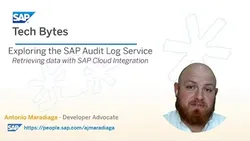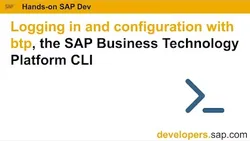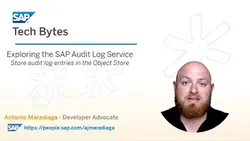
Transformation to Hybrid Landscapes 
ADVERTISEMENT
Course Feature
![]() Cost:
Cost:
Free
![]() Provider:
Provider:
openSAP
![]() Certificate:
Certificate:
Paid Certification
![]() Language:
Language:
English
![]() Start Date:
Start Date:
On-Demand
Course Overview
❗The content presented here is sourced directly from openSAP platform. For comprehensive course details, including enrollment information, simply click on the 'Go to class' link on our website.
Updated in [May 19th, 2023]
The openSAP course "Transformation to Hybrid Landscapes" provides an overview of the different aspects of hybrid deployments. Participants will gain an understanding of the integration, security, and operational aspects of running a hybrid landscape. The course will also cover topics such as adoption, organizational impact, strategy, and roadmap. In the first week, participants will be introduced to cloud and hybrid deployments. The second week will focus on integration technologies and their comparison. The third week will discuss security aspects, while the fourth week will cover operational tasks. The fifth week will conclude the course with a discussion on transformation.
[Applications]
Upon completion of this course, participants will have a better understanding of the implications of transitioning to a hybrid landscape. They will be able to identify the different integration technologies available and the security considerations that need to be taken into account. Additionally, they will be able to recognize the changes in operational tasks when transitioning to a hybrid landscape and develop a strategy and roadmap for their own hybrid transformation journey.
[Career Paths]
1. Cloud Solutions Architect: Cloud Solutions Architects are responsible for designing, developing, and managing cloud-based solutions for their clients. They must have a deep understanding of cloud technologies and be able to develop and implement strategies for cloud-based solutions. They must also be able to troubleshoot and resolve any issues that arise. The demand for Cloud Solutions Architects is growing rapidly as more companies move to the cloud.
2. Hybrid Cloud Engineer: Hybrid Cloud Engineers are responsible for designing, deploying, and managing hybrid cloud environments. They must have a deep understanding of both cloud and on-premise technologies and be able to develop and implement strategies for hybrid cloud solutions. They must also be able to troubleshoot and resolve any issues that arise. The demand for Hybrid Cloud Engineers is growing rapidly as more companies move to hybrid cloud solutions.
3. Cloud Security Analyst: Cloud Security Analysts are responsible for ensuring the security of cloud-based solutions. They must have a deep understanding of cloud security technologies and be able to develop and implement strategies for cloud security. They must also be able to troubleshoot and resolve any security issues that arise. The demand for Cloud Security Analysts is growing rapidly as more companies move to the cloud.
4. DevOps Engineer: DevOps Engineers are responsible for developing and managing the processes and tools used to deploy and manage applications in the cloud. They must have a deep understanding of cloud technologies and be able to develop and implement strategies for DevOps. They must also be able to troubleshoot and resolve any issues that arise. The demand for DevOps Engineers is growing rapidly as more companies move to the cloud.
[Education Paths]
Recommended Degree Paths:
1. Bachelor of Science in Computer Science: This degree path provides students with a comprehensive understanding of computer science fundamentals, including programming, software engineering, and computer architecture. It also covers topics such as artificial intelligence, machine learning, and data science. This degree is ideal for those interested in developing and managing hybrid landscapes, as it provides the necessary technical skills to do so.
2. Master of Science in Information Systems: This degree path focuses on the management of information systems, including the development and implementation of hybrid landscapes. It covers topics such as database management, system design, and system security. This degree is ideal for those interested in managing hybrid landscapes, as it provides the necessary managerial skills to do so.
3. Master of Business Administration (MBA): This degree path provides students with a comprehensive understanding of business management, including topics such as finance, accounting, and marketing. It also covers topics such as organizational behavior, strategy, and leadership. This degree is ideal for those interested in developing and managing hybrid landscapes, as it provides the necessary business skills to do so.
4. Master of Science in Cybersecurity: This degree path focuses on the security aspects of hybrid landscapes, including topics such as cryptography, network security, and digital forensics. It also covers topics such as risk management and incident response. This degree is ideal for those interested in ensuring the security of hybrid landscapes, as it provides the necessary technical skills to do so.
Developing Trends:
1. Cloud Computing: Cloud computing is becoming increasingly popular as a way to manage hybrid landscapes. Companies are increasingly turning to cloud-based solutions to store and manage their data, as well as to provide access to applications and services.
2. Artificial Intelligence: Artificial intelligence is becoming increasingly important in the management of hybrid landscapes. AI-based solutions are being used to automate tasks, such as data analysis and decision-making, as well as to provide insights into the performance of hybrid landscapes.
3. Internet of Things: The Internet of Things (IoT) is becoming increasingly important in the management of hybrid landscapes. IoT-based solutions are being used to monitor and manage the performance of hybrid landscapes, as well as to provide insights into the performance of connected devices.
4. Blockchain: Blockchain technology is becoming increasingly important in the management of hybrid landscapes. Blockchain-based solutions are being used to secure data and transactions, as well as to provide access to distributed applications and services.
Course Provider

Provider openSAP's Stats at AZClass
Discussion and Reviews
0.0 (Based on 0 reviews)
Explore Similar Online Courses

BlendMasters Volume 1: Model a Concept Car for Film in Blender

Artistic Self-Portrait Photography

Python for Informatics: Exploring Information

Social Network Analysis

Introduction to Systematic Review and Meta-Analysis

The Analytics Edge

DCO042 - Python For Informatics

Causal Diagrams: Draw Your Assumptions Before Your Conclusions

Whole genome sequencing of bacterial genomes - tools and applications

Exploring the SAP Audit Log Service - Using SAP Cloud Integration

Logging in and configuration with btp the SAP Business Technology Platform CLI


Start your review of Transformation to Hybrid Landscapes